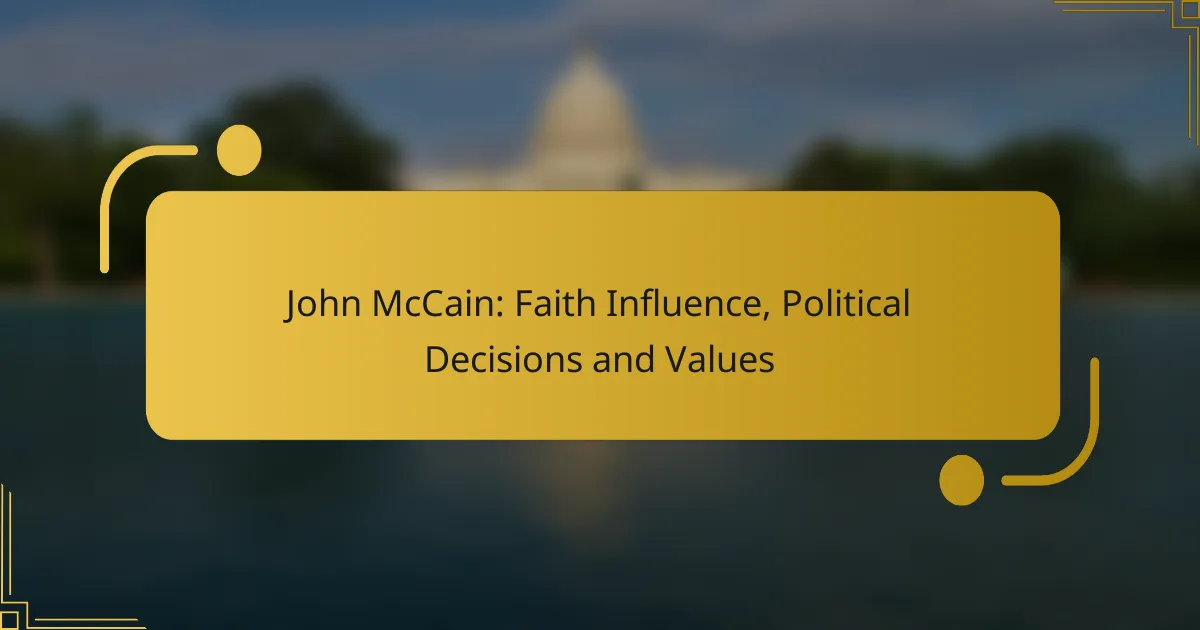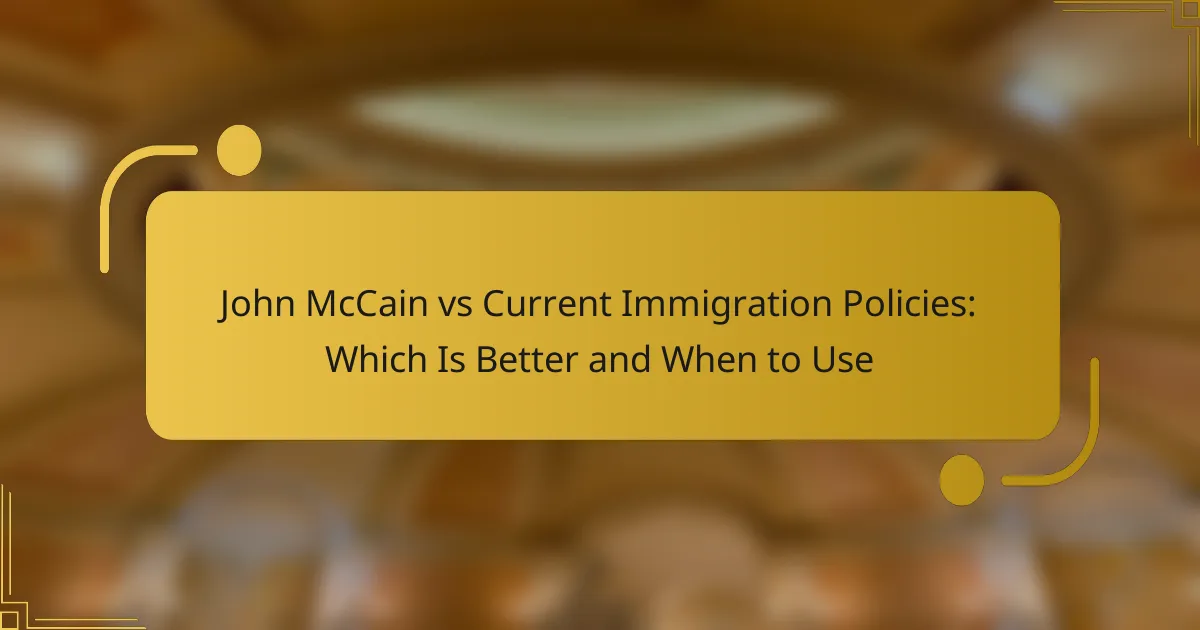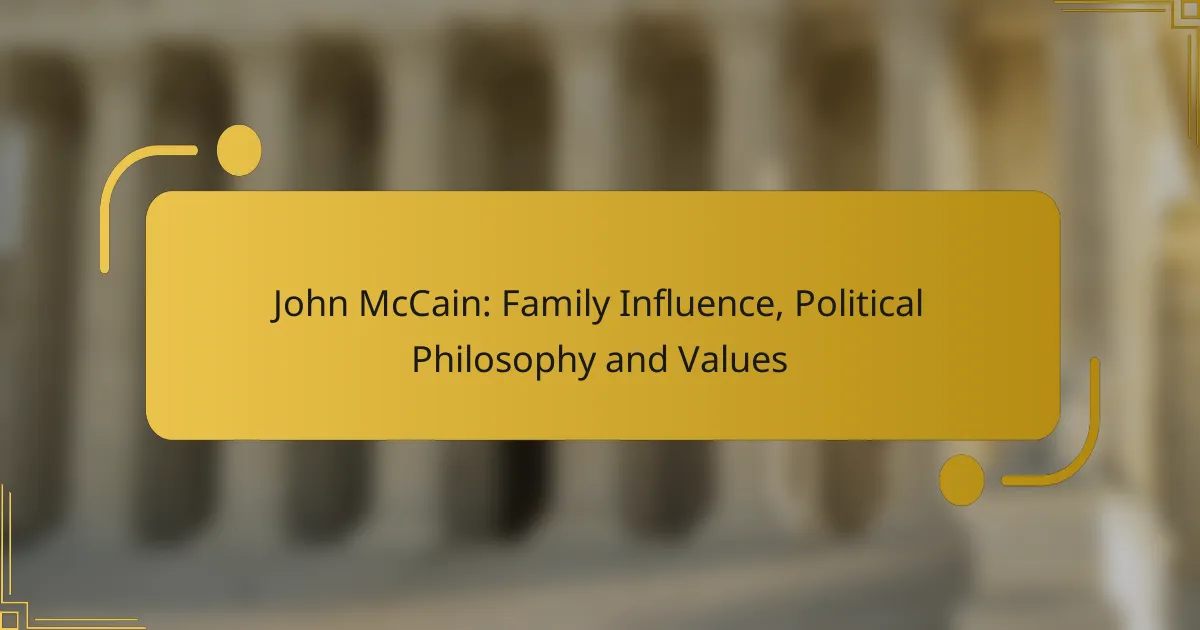John McCain’s faith significantly influenced his political decisions, shaping his moral compass and guiding his commitment to principles like service and integrity. His dedication to bipartisanship, national security, and veterans’ rights reflected his core values, resonating deeply with voters and fostering loyalty among his supporters in Arizona.

How did John McCain’s faith influence his political decisions?
John McCain’s faith played a significant role in shaping his political decisions, guiding his moral compass and influencing his views on various issues. His Christian beliefs often informed his commitment to principles such as service, integrity, and compassion in public life.
Role of Christianity in McCain’s life
Christianity was a foundational aspect of John McCain’s upbringing and personal identity. Raised in a military family, he was exposed to the values of duty and honor, which were deeply intertwined with his faith. Throughout his life, McCain emphasized the importance of faith in providing strength during challenging times, particularly during his years as a prisoner of war.
McCain’s faith also fostered a sense of community and responsibility towards others, motivating him to engage in public service and advocate for the less fortunate. His belief in the teachings of Christianity often reflected in his approach to governance and his interactions with constituents.
Impact of faith on policy-making
McCain’s faith influenced his policy-making, particularly in areas such as healthcare, immigration, and foreign policy. He often advocated for compassionate solutions that aligned with his Christian values, emphasizing the need for humane treatment of individuals regardless of their circumstances. For instance, his support for comprehensive immigration reform was partly rooted in a belief in the dignity of every person.
Additionally, McCain’s faith led him to champion veterans’ issues, reflecting his commitment to those who served the country. He believed that honoring veterans was not just a political obligation but a moral one, driven by his understanding of sacrifice and service.
McCain’s public expressions of faith
John McCain was open about his Christian faith, often referencing it in speeches and public appearances. He spoke about the importance of prayer and the role it played in his life, especially during difficult moments. His public expressions of faith were not merely rhetorical; they were integral to his identity as a leader.
In his later years, McCain’s reflections on faith included discussions about forgiveness and reconciliation, particularly in the context of political polarization. He advocated for a politics that embraced civility and respect, drawing on his Christian values to encourage unity and understanding among differing viewpoints.

What core values shaped John McCain’s political career?
John McCain’s political career was fundamentally shaped by his commitment to bipartisanship, a strong emphasis on national security, and advocacy for veterans’ rights. These core values guided his decisions and actions throughout his time in public service, reflecting his belief in collaboration, safety, and support for those who served the nation.
Commitment to bipartisanship
John McCain was known for his dedication to bipartisanship, often working across party lines to achieve meaningful legislation. He believed that cooperation between Democrats and Republicans was essential for effective governance and addressing the nation’s challenges.
Examples of his bipartisan efforts include his work on the McCain-Feingold Act, which aimed to reform campaign finance, and his collaboration with Democrats on immigration reform. McCain’s ability to engage with opposing viewpoints often led to significant policy advancements.
Emphasis on national security
National security was a cornerstone of McCain’s political philosophy, shaped by his experiences as a Navy pilot and prisoner of war. He advocated for a strong military and robust foreign policy to protect American interests and promote global stability.
McCain frequently emphasized the importance of addressing threats from terrorism and authoritarian regimes. His support for military interventions, such as in Libya, reflected his belief in proactive measures to safeguard national security.
Advocacy for veterans’ rights
Throughout his career, McCain championed the rights and welfare of veterans, drawing from his own experiences as a veteran. He fought for improved healthcare, benefits, and support systems for those who served in the armed forces.
His efforts included advocating for the Veterans Affairs reform, which aimed to enhance the quality of care and reduce wait times for veterans seeking medical assistance. McCain’s commitment to veterans was a defining aspect of his legacy, underscoring his belief in honoring their sacrifices.

How did McCain’s values resonate with voters in Arizona?
John McCain’s values resonated deeply with voters in Arizona due to his commitment to bipartisanship, military service, and integrity. His ability to connect with local issues and constituents made him a prominent figure in the state, fostering a strong sense of loyalty among his supporters.
Connection with local constituents
McCain maintained a close relationship with Arizona residents, often engaging in town hall meetings and local events. This direct interaction allowed him to understand and address the specific concerns of his constituents, such as immigration, healthcare, and economic development.
His advocacy for issues like water rights and border security, which are particularly relevant in Arizona, further solidified his connection with voters. McCain’s willingness to listen and adapt his policies to reflect local needs made him a trusted representative.
Influence of McCain’s military background
McCain’s military service as a naval aviator and his experience as a prisoner of war significantly shaped his political identity. His background instilled values of duty, sacrifice, and resilience, which resonated with many voters who respect military service.
His focus on national security and veterans’ affairs reflected a deep commitment to those who serve the country, appealing to Arizona’s substantial veteran population. This connection helped to reinforce his image as a leader who understood the sacrifices made by service members and their families.
Public perception of McCain’s integrity
McCain was widely regarded for his integrity and willingness to stand up for his principles, even when it meant going against his party. This reputation earned him respect across party lines, making him a unique figure in Arizona politics.
His consistent stance on issues like campaign finance reform and immigration showcased his commitment to ethical governance. Voters appreciated his honesty and transparency, which contributed to a lasting legacy of trust among his constituents.

What were the key political decisions influenced by McCain’s principles?
John McCain’s political decisions were largely shaped by his commitment to principles such as integrity, bipartisanship, and national security. His stances on immigration, healthcare, and foreign policy reflect these values and have had a lasting impact on American politics.
Stance on immigration reform
McCain advocated for comprehensive immigration reform, believing in a balanced approach that included a pathway to citizenship for undocumented immigrants. He supported measures that combined border security with opportunities for legal status, emphasizing the need for a humane solution to immigration challenges.
His bipartisan efforts included the McCain-Kennedy bill, which aimed to address both enforcement and the rights of immigrants. McCain’s stance often faced criticism from both sides, illustrating the complexities of immigration policy in the U.S.
Healthcare policy initiatives
McCain’s healthcare policy was characterized by a focus on market-based solutions and opposition to the Affordable Care Act (ACA). He believed that reforms should enhance competition and give consumers more choices, rather than expanding government involvement.
Despite his opposition to the ACA, McCain supported efforts to improve healthcare access and affordability, advocating for measures that would lower costs while maintaining quality. His approach often highlighted the need for bipartisan cooperation in addressing healthcare issues.
Foreign policy decisions in the Middle East
McCain was a strong proponent of a robust U.S. presence in the Middle East, advocating for military intervention in conflicts such as those in Iraq and Syria. He believed that American leadership was essential for stability in the region and often criticized isolationist policies.
His foreign policy decisions were influenced by a commitment to democracy and human rights, leading him to support various opposition groups in the region. McCain’s perspective on foreign affairs emphasized the importance of strategic alliances and the need to confront authoritarian regimes.

How did John McCain’s faith and values evolve over time?
John McCain’s faith and values underwent significant evolution throughout his life, shaped by personal experiences, political changes, and his commitment to public service. His journey reflects a deepening understanding of morality, duty, and the complexities of governance.
Influence of personal experiences
McCain’s personal experiences, particularly his time as a prisoner of war in Vietnam, profoundly impacted his faith and values. Enduring years of hardship and torture led him to reflect on the importance of resilience, honor, and forgiveness. These experiences instilled in him a strong sense of duty to his country and a commitment to serve others.
Additionally, McCain’s family background played a crucial role in shaping his beliefs. Coming from a military family, he was instilled with values of service and sacrifice from an early age, which influenced his political decisions and moral compass throughout his career.
Changes in political landscape
Throughout his political career, McCain navigated a rapidly changing political landscape, which influenced his values and decision-making. As the Republican Party shifted towards more conservative ideologies, McCain often found himself at odds with party lines, advocating for bipartisanship and pragmatic solutions instead. This willingness to diverge from party expectations showcased his evolving beliefs about governance and collaboration.
Moreover, McCain’s stance on issues such as immigration reform and healthcare reflected a more compassionate approach, emphasizing the need for humane policies. His ability to adapt his views in response to societal changes demonstrated his commitment to the principles of justice and equality.
Legacy of McCain’s evolving beliefs
McCain’s evolving beliefs have left a lasting legacy in American politics, characterized by his dedication to integrity and service. He is remembered for his willingness to challenge the status quo and prioritize the nation’s interests over partisan politics. His commitment to principles such as freedom, democracy, and human rights continues to inspire future leaders.
Furthermore, McCain’s legacy encourages a more inclusive political discourse, urging politicians to engage with differing viewpoints. His life serves as a reminder of the importance of personal growth and the impact of faith and values on public service.

What lessons can be learned from John McCain’s political journey?
John McCain’s political journey teaches the importance of integrity, collaboration across party lines, and the influence of personal beliefs on leadership. His career exemplifies how these values can shape effective governance and inspire public trust.
Importance of integrity in politics
Integrity is foundational in politics, as it fosters trust between leaders and constituents. McCain’s commitment to honesty, even when unpopular, earned him respect across the political spectrum.
Maintaining integrity involves being transparent about decisions and holding oneself accountable. Politicians can enhance their credibility by admitting mistakes and prioritizing ethical standards over expediency.
Value of cross-party collaboration
Cross-party collaboration is essential for effective governance, as it allows for diverse perspectives and more comprehensive solutions. McCain often worked with members of opposing parties to achieve common goals, demonstrating that bipartisanship can lead to significant legislative successes.
To foster collaboration, politicians should focus on shared interests and be willing to compromise. Building relationships across party lines can lead to more sustainable policies that benefit a broader audience.
Enduring impact of personal beliefs on leadership
Personal beliefs significantly influence a leader’s decisions and actions. McCain’s values, shaped by his experiences, guided his approach to issues such as foreign policy and veterans’ rights, showcasing how personal convictions can drive public service.
Leaders should reflect on their core beliefs and how these inform their policies. Authenticity in leadership can resonate with constituents, creating a deeper connection and fostering loyalty among supporters.



